Speeches Shim
USAID is proud and excited to announce that the work done by six of its implementing partners during the COVID-19 pandemic was recognized as PEPFAR Heroes. The award recipients were honored on December 2 during a virtual World AIDS Day celebration with the U.S. Ambassador to Kenya Kyle McCarter. The PEPFAR Hero Awards were given out by PEPFAR Kenya in recognition of people who, despite the pandemic, went above and beyond their call of duty to ensure that Kenyans living with HIV continued to receive antiretroviral therapy. Antiretroviral therapy is essential for people living with HIV to live longer, healthier lives, and maintain virologic suppression.
The award recipients working with USAID’s implementing partners are:
Dr. Abdulnoor Ismail Mohamed
Nominated by USAID’s program with the United Nations Office on Drugs and Crime
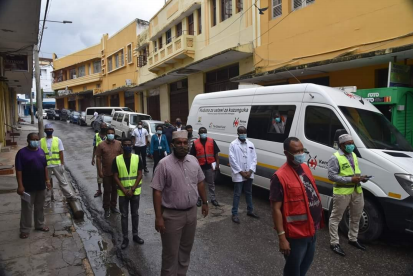
Dr. Abdulnoor is the facility in-charge at the Kisauni medically assisted therapy clinic and the program focal point for the Mombasa County medically assisted therapy program. Through Dr. Abdulnoor’s selfless leadership, medically assisted therapy clients in Mombasa County retained access to methadone and antiretroviral therapy treatment services throughout the COVID-19 pandemic, with minimal disruption. The measures he helped implement included free movement permits for medically assisted therapy clients, the mobile dispensing of methadone, the reopening of an unused dispensing facility, and personal protective equipment for clients and staff. Many programs scaled down during COVID-19, but the Mombasa County medically assisted therapy program inducted an additional 400 clients.
Jeremiah Kiplagat, Jonathan Mwanake, Ronald Museni and Dishon Olumu
Nominated by USAID’s Afya Pwani program
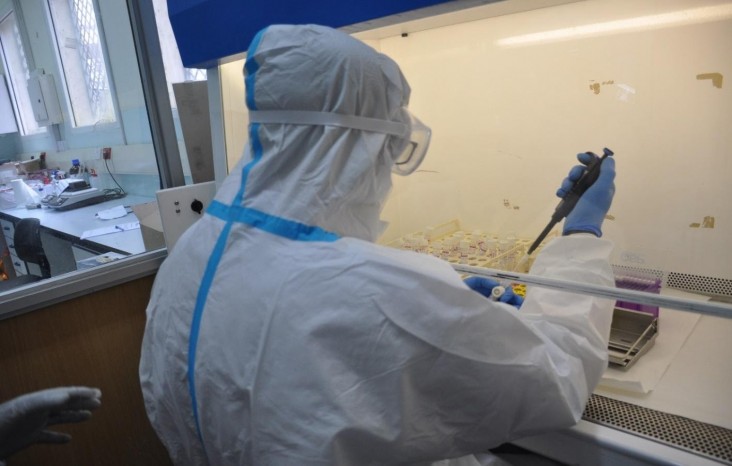
Afya Pwani’s laboratory team in Mombasa showed extraordinary courage and resilience in the most challenging times. Several staff members at the Coast Provincial General Hospital molecular testing laboratory contracted COVID-19 in May 2020. Jeremiah, a laboratory molecular analyst, and Jonathan, a laboratory technologist, had been exposed, but tested negative. They requested that arrangements be made for them to be picked up from the isolation center so they could process specimens during extra hours or the night, allowing the laboratory to continue with HIV-related testing. Dishon, a senior laboratory technologist, left his work at the office and facilities to work in the molecular laboratory, so that there was continuity of services. Ronald, a motorcycle rider who collects samples and transports them from peripheral facilities to the laboratory, contracted COVID-19 while in the line of duty, but immediately got back to transporting samples after recovering.
Daniel Oluoch-Madiang’
Nominated by USAID’s Afya Ziwani program
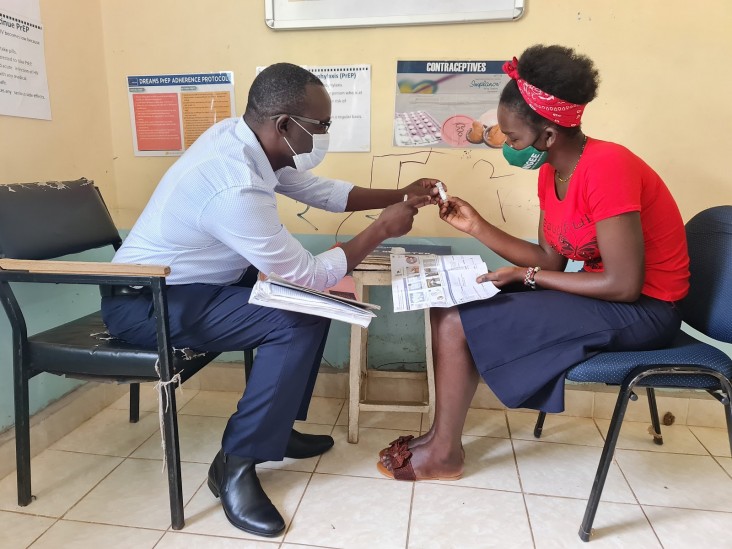
Daniel is Afya Ziwani’s technical advisor for vulnerable adolescent girls and young women (AGYW) in Homa Bay, Kisumu, and Migori counties. The COVID-19 restrictions placed by national and county governments on meetings threatened the continuity of group-based sessions with AGYW at safe spaces or girl hubs. Daniel helped the AGYW services adapt to the COVID-19 restrictions. The new measures included using calls, text messages, WhatsApp messages and video to offer counseling services to AGYW; setting up temporary or mobile safe spaces for AGYW living in close proximity to each other; and implementing home delivery for services such as pre-exposure prophylaxis, HIV self-tests, and condoms. Daniel was able to quickly have these models scaled up across all 260 safe spaces, 49 wards, and 16 sub-counties.
Busia County Referral Hospital team
Nominated by USAID’s Academic Model Providing Access to Healthcare Plus (AMPATHPlus) program
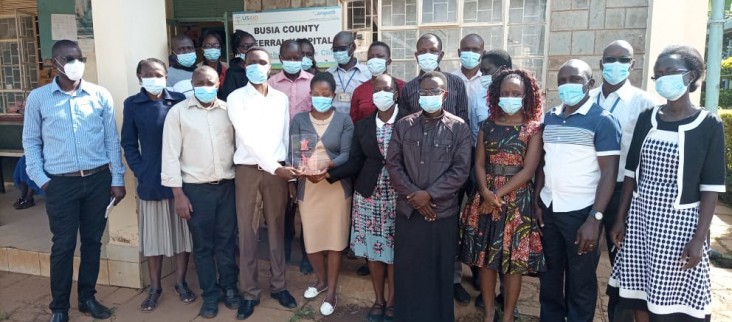
Busia County Referral Hospital sits at the border of Kenya and Uganda and serves clients from both sides. It saw its services disrupted by COVID-19 with HIV clients defaulting on treatment. AMPATHPlus developed a WhatsApp group with health care workers from both Uganda and Kenya to curb this trend and promote clients’ well-being. Peer educators from both sides worked on the active tracing of clients who defaulted and other initiatives to improve patient care and management. The WhatsApp platform contributed significantly to retaining and increasing the number of mobile clients on treatment. It allowed for documentation and information sharing on those who were due for treatment but were stuck because of COVID-19 lockdowns. Through intergovernmental collaboration, drugs were delivered to mobile populations who were stuck on the other side of the border.
Vivian Mugambi
Nominated by USAID’s Comprehensive Assistance, Support and Empowerment of Orphans and Vulnerable Children (CASE-OVC) program
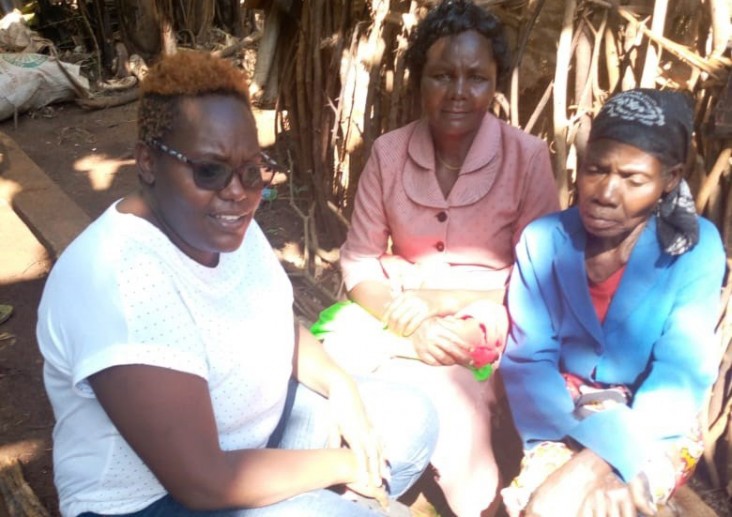
Community Micro-Enterprise for Hope Africa is a non-profit organization in Meru County that runs various community initiatives, including support for orphans and vulnerable children through USAID’s CASE-OVC program. During the COVID-19 pandemic, it experienced a surge in the number of children and adolescents living with HIV who were defaulting on their medication. Vivian responded to this emerging need by negotiating a subsidized rate for bulk messages with Safaricom so that defaulters could be encouraged to resume taking antiretrovirals through frequent phone calls and SMS. She also helped arrange food support and medicine deliveries for children and adolescents living with HIV. Additionally, Vivian worked closely with health facilities to facilitate peer support group meetings for children and adolescents living with HIV. Since some of these young people were beginning to have higher viral loads, challenges that they were facing could be addressed during the meetings, such as social stigma, self-stigma, and peer pressure.
Steve Anguva
Nominated by USAID’s Tuberculosis Accelerated Response and Care II (TB ARC II) program
Steve is a former TB patient and a TB champion. After fully recovering, Steve formed a patient support group called Pamoja that is made up of former and current TB patients, some of which are also infected with HIV. The group has been creating awareness on TB and HIV, as well as supporting patients to adhere to and complete their treatment. Due to COVID-19, clients in Steve’s neighborhood stopped seeking out health services, while patients on treatment skipped clinical reviews and drug refills. Steve mobilized his group to conduct house-to-house visits to raise awareness on TB, HIV, and the need to seek out health services. He also helped patients who had traveled to their hometowns and gotten stuck due to government-imposed restrictions to get treatment in nearby facilities. “We were able to follow up with at least 80 percent of the clients from the five health facilities we support in the sub-county, ensuring they have access to medication and are adhering amid the COVID-19 pandemic,” he says.

Comment
Make a general inquiry or suggest an improvement.